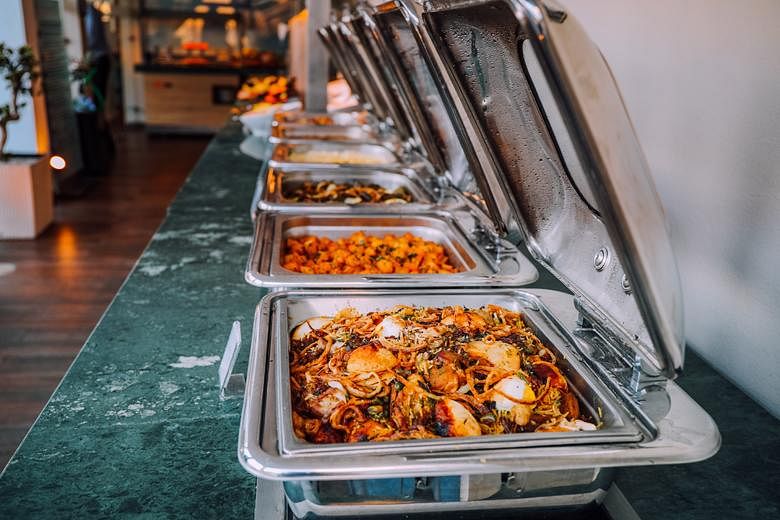SINGAPORE - A business meeting at Grand Hyatt Singapore in January has been linked to more than a dozen coronavirus cases in at least six countries, from Spain to South Korea.
Following reports that people had shared a meal at a buffet during the event, some readers have asked if attending a buffet might increase their chances of becoming infected with the coronavirus.
The Straits Times speaks to experts to find out.
Q: Do buffets increase people's risk of being infected?
A: The group environment of a buffet - where diners touch communal ladles, and come into close contact with other people - may result in a higher risk of transmission, said Professor William Chen, the Michael Fam chair professor and director of Nanyang Technological University's Food Science and Technology Programme.
But food heated above 60 deg C poses no higher risk of transmitting the coronavirus, he said.
"The envelope of the coronavirus would be destroyed by the heating station, thus rendering it not infectious," he said, referring to the layer surrounding the virus' core.
Q: If droplets from an infected person fall onto the food on display, could people who consume this become infected too?
A: The chances of this are low. NTU's Prof Chen explained that the coronavirus infects cells in the respiratory tract - but not in other tissue, such as intestinal cells.
His remarks are in line with those made by the Singapore Food Agency, which said in a Facebook post last month that there is "currently no evidence that the novel coronavirus is associated with the consumption of food".
Q: Can the coronavirus survive in food?
A: Unlike food poisoning-causing bacteria, viruses do not multiply in food, since they need living hosts to proliferate, said Prof Chen.
He added that food at a buffet kept warm above 60 deg C is safe, since the heat would destroy the envelope of the coronavirus that is responsible for its ability to infect.
Q: What are some precautions restaurants and diners can take?
A: Hygiene measures - such as providing hand sanitisers and having masked servers dish out food - could all help reduce the risk of coronavirus transmission, said Prof Li Dan, assistant professor at the National University of Singapore's department of food science and technology.
Having diners order buffet items from their tables, instead of serving themselves, could also help, she added.
NTU's Prof Chen said that there is no reason to stay away from buffets with proper attention to personal hygiene, and keeping food above 60 deg C. He also said that eating in smaller groups would help minimise transmission.
Food safety expert Loych Lee, from training and consultancy group CCIS, said: "If you are worried, avoid crowded areas ."
Hotels have, meanwhile, stepped up measures to reduce the risk of spreading the virus. These range from temperature checks to installing hand sanitisers and carrying out thorough cleaning and disinfection.

Mr Kieran Twomey, group chief operating officer of Millennium Hotels and Resorts, said: "For all buffet set-ups, there are more frequent replenishments of food items to ensure that food served is fresh." He added that restaurants already have semi-buffet options.
Mr Michael Martin, general manager of InterContinental Singapore, said the hotel has temporarily revised restaurant Ash and Elm's buffet and semi-buffet menus.
The restaurant's Sunday Seafood Champagne Buffet Brunch, for instance, is now available as a six-course weekend brunch set menu, with highlights from the buffet served to each table.












